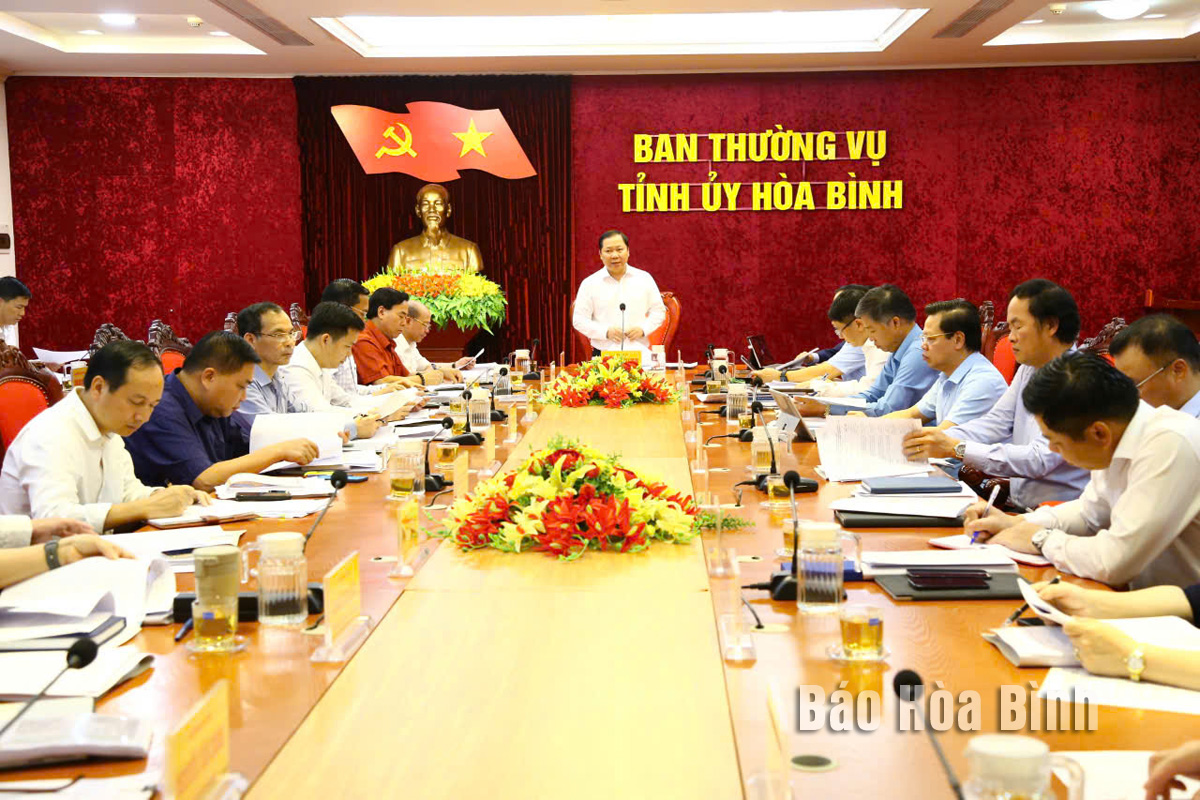
Hoa Binh province’s steering board for implementing the plan on preserving and promoting the values of the Muong ethnic culture and the Hoa Binh Civilisation during 2023 - 2030 held a meeting on November 6 to review the plan implementation. The event was chaired by Nguyen Phi Long, alternate member of the Party Central Committee, Secretary of the provincial Party Committee, and head of the steering board.
Nguyen Phi Long, alternate member of the Party Central
Committee, Secretary of the provincial Party Committee, addresses the meeting.
In the recent past, the communications and
introduction of the values of the Muong ethnic group’s culture and the Hoa Binh
Civilisation have been promoted on mass media outlets. Agencies, units, and
localities have built schemes for carrying out the plan.
In particular, more attention has been paid to
the preservation and promotion of intangible cultural heritage. Hoa Binh has
coordinated with the Vietnamese Institute for Musicology and the People’s
Committees of relevant provinces and cities to compile a scientific dossier
submitted to UNESCO to seek the inscription of "mo Muong” into the list of
intangible cultural heritage in need of urgent safeguarding.
The province has also boosted the survey and
collection of intangible cultural heritage of the Muong ethnic minority. So
far, four intangible cultural heritage elements of Muong people have been named
national ones, and dossiers on two others are being submitted for recognition.
Efforts are being made to restore and preserve some typical traditional
festivals of Muong people. In addition, authorities are also working with the
education and training sector to boost the teaching of the Muong ethnic script.
Regarding the Hoa Binh Civilisation, the
province proposed the Prime Minister list the Trai hamlet cave in Tan Lap
commune and the Vanh village stone shelter in Yen Phu commune (Lac Son
district) as special national relic sites. Departments and sectors have been
working with the Lac Son People’s Committee to build a plan on rehabilitating
those two sites. Besides, coordination with the Institute of Archaeology has
also been enhanced to survey and research archaeological relics of the Hoa Binh
Civilisation.
At the meeting, participants discussed
difficulties and obstacles to the plan implementation.
Nguyen Phi Long, alternate member of the Party
Central Committee and Secretary of the provincial Party Committee, said the
plan has been carried out methodologically over the past year, with certain
encouraging results recorded.
However, as cultural value preservation and
promotion is a tough task with a heavy workload, he requested the provincial
People’s Committee order related units and localities to invest more efforts in
performing the duties for 2024.
The preservation and promotion of cultural
values requires the engagement of the entire political system, he said, adding
that it is necessary to connect the work with tourism development, pay due heed
to the personnel in charge of preserving the Muong ethnic culture and the Hoa
Binh Civilisation, and earmark part of the local budget for cultural affairs.
Mai Chau district has firmly established itself as a standout destination on Vietnam’s tourism map, attracting both domestic and international visitors with its breathtaking landscapes, rich ethnic culture, and warm hospitality. However, beyond its natural and cultural charm, a secure and well-managed tourism environment has added to Mai Chau’s appeal.
As Vietnam enters a new phase of economic and administrative reform in 2025, Hoa Binh province is stepping up its efforts to streamline governance, boost economic growth, and attract investment.
The Hoa Binh provincial People's Committee held its monthly meeting on March 26 to review the progress of key projects, assess budget revenue and public investment disbursement, provide feedback on draft documents for submission to the provincial Party Committee's Standing Board, and discuss other important matters related to the committee's governance activities.
Playing a key role in Hoa Binh province’s economic development, Luong Son district has been focusing on science and technology development, innovation, and digital transformation.
Identifying the application of online public services as a key step in administrative procedure reform and e-government building, Kim Boi district has proactively provided services and supported residents and businesses in accessing and utilising full-process online public services promptly and efficiently. The locality aims to lift the rate of end-to-end online public services to over 90%, with all officials and civil servants handling tasks in the digital environment.
Nguyen Anh Tuyet, hailing from a family steeped in the ancient art of herbal medicine, is transforming local medicinal herbs into high-value concentrated extracts, elevating their worth and healing potential.



